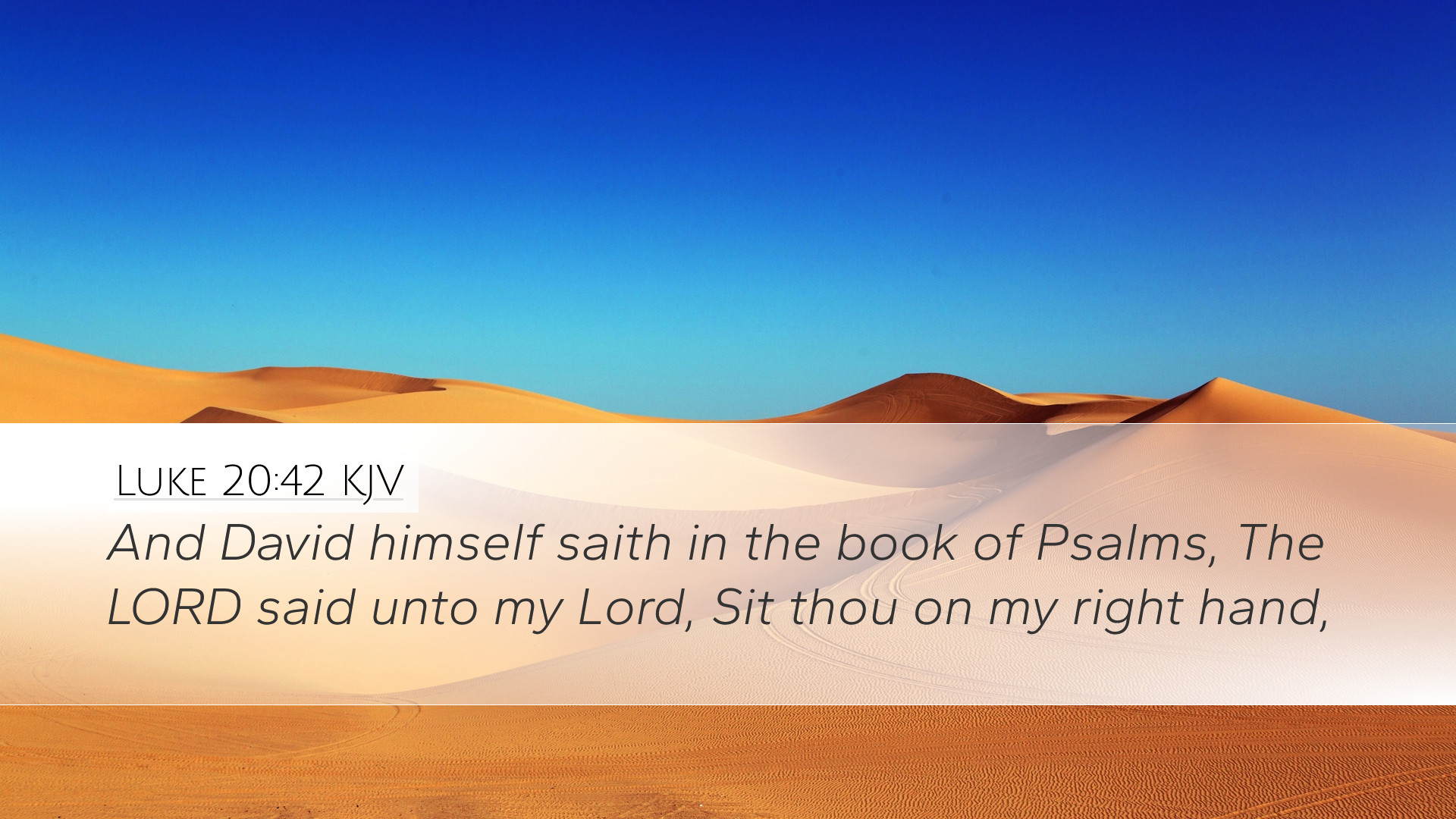Commentary on Luke 20:42
Luke 20:42 presents a pivotal moment in the teachings of Jesus, as it touches on the Davidic Christology and the understanding of the Messiah's identity. This passage reads:
"And David himself saith in the book of Psalms, The Lord said unto my Lord, Sit thou on my right hand."
Contextual Overview
This verse is part of a dialogue where Jesus challenges the Pharisees' understanding of the Messiah. They had a limited view, seeing the Messiah merely as a descendant of David. Jesus uses David’s own words in Psalm 110:1 to show that the Messiah is not just a descendant but also David's Lord.
Insights from Public Domain Commentaries
Matthew Henry's Commentary
Matthew Henry emphasizes that the Lord’s declaration to David reveals a profound truth about the identity of the Messiah. David, though great, recognizes a greater authority: the Messiah. Henry comments on the implications of this, illustrating that:
- Divine Authority: Jesus stresses the divine nature of the Messiah, who has authority over even the greatest of human figures.
- Intercession: “Sit thou on my right hand” signifies a place of honor and authority, suggesting that Jesus fulfills this role in the heavenly realm.
- Challenge to Pharisaic Theology: This insight challenges the Pharisees’ narrow understanding of the Messiah’s lineage and role.
Albert Barnes' Notes on the Bible
Albert Barnes provides a detailed explanation of the significance of this verse, placing it within the broader theological framework of Christ’s mission. Barnes notes that:
- The Messiah's Dual Nature: The phrasing indicates that the Messiah is both human (as a descendant of David) and divine (as Lord). This duality underscores the Christian understanding of Christ.
- Historical Context: By referencing Psalm 110, which was recognized as a Messianic psalm, Jesus affirms His identity as the fulfillment of Davidic prophecy.
- Exegetical Importance: This verse serves as a critical argument for the deity of Christ, presenting a scriptural basis for the belief in His divine status.
Adam Clarke's Commentary
Adam Clarke highlights the theological implications of the relationship between David and the Messiah, stressing the following points:
- Revelation of Divine Truth: Clarke points out that this revelation is a discourse on divine truth wherein God speaks to David, indicating a direct communication from the divine to humanity.
- Covenantal Significance: The phrase “Sit thou on my right hand” symbolizes the establishment of a new covenant, one that surpasses the old covenant established through David.
- Apologetic Value: Clarke argues that this verse can be used as a strong apologetic tool in defending the nature of Christ against detractors who deny His divinity.
Theological Implications
Theologians often draw on this passage to address key Christological doctrines. The implications include:
- Christ’s Supremacy: The quote illustrates Christ’s superiority over David and establishes His rightful place in the heavenly hierarchy.
- Trinitarian Understanding: This dialogue hints at the relational dynamic within the Trinity, where the Father speaks to the Son, affirming Jesus’ divine nature.
- Messianic Expectations: It reshapes our understanding of messianic expectations; the Messiah is not only a king like David but the sovereign Lord.
Application for Pastors and Theologians
This profound truth invites reflection for pastors and theologians. Here are some practical applications:
- Preaching the Supremacy of Christ: Sermons can focus on imparting the understanding of Christ as both Savior and Sovereign, fulfilling the messianic prophecy in a revolutionary way.
- Encouraging Deep Theological Study: Encouraging congregations to explore the deeper implications of Jesus' identity challenges them to grow in their faith and knowledge.
- Fostering Dialogue: Use this verse to engage in meaningful discussions with those who hold differing views on the nature of Christ, utilizing the scripture as a basis for dialogue.
Conclusion
Luke 20:42 stands as a profound proclamation of Christ's identity, prompting us to recognize the depth of His lordship and the implications for how we view His role in our lives. The insights gathered from esteemed commentaries enrich our understanding and empower us to teach and preach the truth of the Gospel with clarity and confidence.


